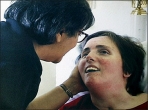
Professor in the Faculty of Medicine
Founding Director of the Faculty of Law's Centre for Medicine,
Ethics and Law at McGill University
Terry Schiavo is dead. The decision about withdrawing her feeding tube turned into a political circus and ideological battleground in which, for many participants, she was the pawn and victim through whom they could score points. Her most important legacy, however, is to show the complexity of decisions about whether a feeding tube on which life depends may be withdrawn. To respond ethically to individuals and to formulate ethical public policy to govern such cases, we must identify and understand that complexity.
Because all of us as babies require someone else to provide us with food and water, withholding them has a special personal impact and also is highly symbolic. We rightly recoil from seeing ourselves as causing people who are dependent on us for the necessities of life to die of thirst or starvation. Indeed, it is a criminal offence not to provide the necessities of life, including food and water, to those in our care. But does tube-feeding constitute “food and water” or is it a medical treatment? Medical treatment may be withdrawn when that can be justified; food and water must not be.
“The Ethical Complexity of the Terry Schiavo Case”, Canadian Disability, Summer/Fall 2005: 5-6
- euthanasia
- hydration and nutrition
- palliative care
